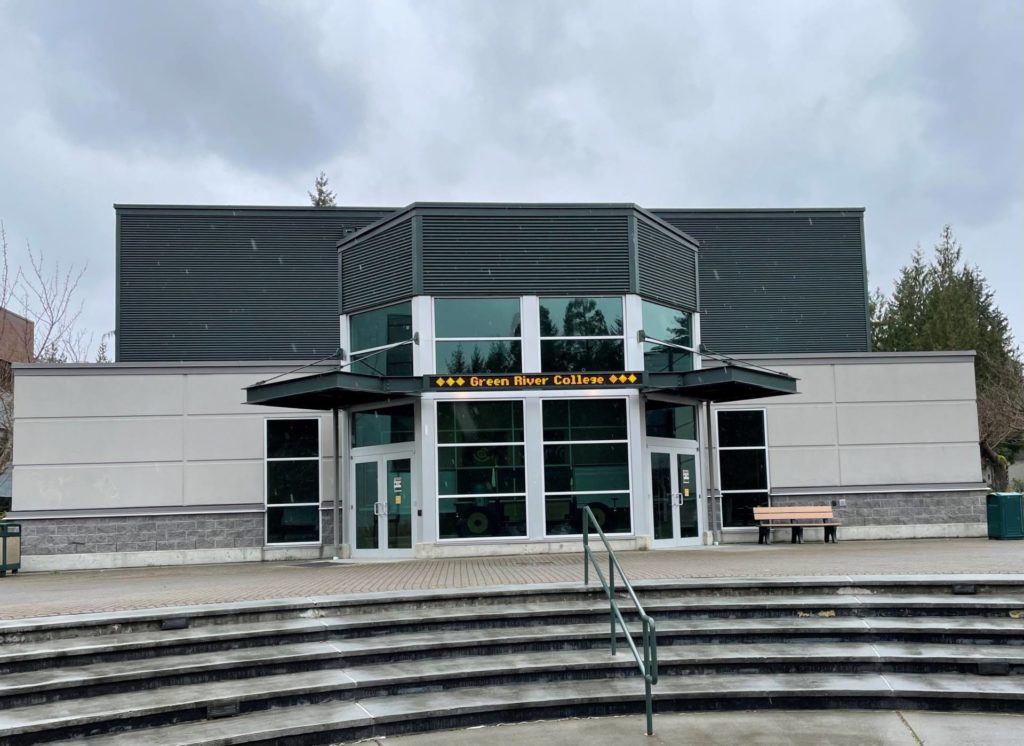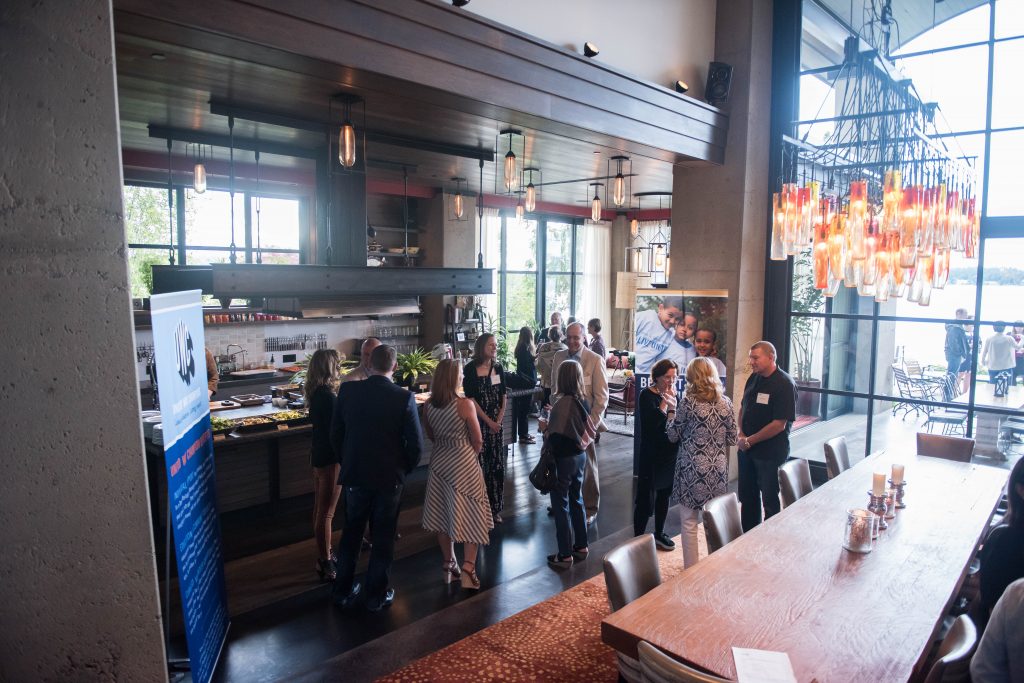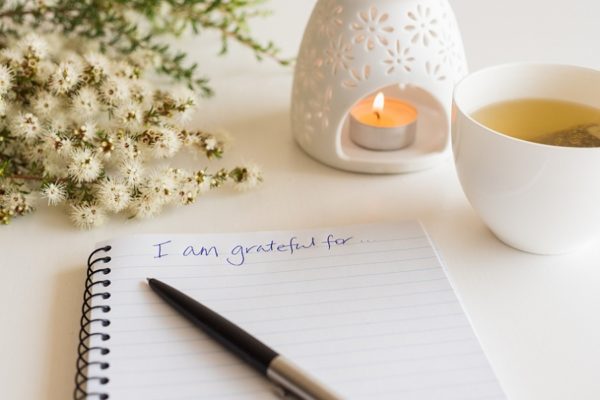Bridge to Finish Builds Pathways to Success
This blog post was written by Lauren McGowan, associate vice president for ending homelessness and poverty at United Way of King County.
Everyone in our community should have equitable access to safe housing, healthy food, a quality education, childcare, health care and the income to weather a financial emergency. These basic needs are inherently linked and together provide a safety net for people in need. When that safety net works, it ensures that people have access to economic opportunities that help them thrive. When it is fractured, it can’t save people from falling through.
Over the last few years United Way of King County has been working to weave those basic needs services together for a population that often falls through the safety net but is so close to achieving those economic opportunities – our community college students. With a focus on students of color, first generation college students and parenting students, we launched our Bridge To Finish campaign to increase persistence and completion rates for community college students in King County. And we have learned a lot.
Our Bridge to Finish Campaign has raised nearly $15 million to provide coordinated access to basic needs services for thousands of students annually at our on-campus and virtual Benefit Hubs. Through strategic partnerships with 10 colleges, an incredible team of AmeriCorps members and partnerships with Neighborhood House and American Financial Solutions, we have developed a model for connecting students to the resources they need—including food, rent, tax credits, public benefits and financial coaching. During the 2020-2021 school year, Bridge to Finish connected 6,000 students to 27,000 financial supports. At the midway point of the 2021-2022 school year, we have connected 3,581 students to 25,215 financial interventions.
Our team has worked hard to hire people who reflect the community and facilitate outreach in ways that reach our target populations. We are pleased to share that:
- 62% identify as first-generation college students
- 55% identify as multi-lingual
- 41% identify as a parent
- 73% identify as BIPOC
Evaluating Impact
From the time the program launched, it was clear that students were accessing services—but we wanted to know if these services were improving persistence and completion rates. Our partners at Washington Student Achievement Council and MDRC are helping us evaluate this. They’ve found that between 2018-2021, 84% of students who received at least one Bridge to Finish service during a given quarter completed a credential or persisted to the next quarter, a rate that is nearly 13 percentage points higher than all non-Bridge to Finish participants at the same institutions. We are excited to see this. Importantly, persistence or completion rates were markedly higher for Bridge to Finish students of all racial groups compared to all non-Bridge to Finish students. We look forward to sharing more details of the evaluations we have in the coming months.
Here are a few things we have learned:
- We should trust students.
- We should be ready for fierce conversations that disrupt broken, racist and unjust systems.
- We should embrace technology. United Way supports Edquity, an emergency aid technology platform for college students. Edquity is revolutionizing the administration of emergency grants. So are the platforms Benefits Data Trust and Code for America, which are transforming access to SNAP, tax credits and other benefits.
- We should be ready to hear “no”—but we should not take “no” for an answer, because students deserve better.
- We need to make better use of existing data to enroll students in government benefits.
- We should understand that, just because it has always been done a certain way, doesn’t mean that way should continue.
- We should dream big and grow the programs that work. If you are only serving a percentage of students who are hungry or experiencing homelessness, you aren’t doing enough.
- We should embrace the fact that community colleges are remarkable places with huge potential to increase economic opportunity.

We are excited by the progress of the Bridge to Finish Campaign and grateful to our incredible team, partners and colleges. And there is a lot more work to do to both learn in King County and share these findings with the state and federal partners. Every student in Washington state and across the country should have access to the resources they need to thrive.
United Way is Committing to:
- Increasing our fundraising commitment from $15 million to $20 million. This will allow us to help more students and continue to learn from our Benefits Hub lab sites in the coming years while we work to expand policy and systems change efforts.
- Continuing to trust students, center equity, and ensure the programs and polices we support are explicitly anti-racist.
- Deepening partnerships with colleges that are committed to fully implementing the Benefits Hub model and disrupting the status quo. Going deeper will help us better understand what it costs to replicate a best-in-class model of student supports.
- Continuing to evaluate what is and isn’t working and share those finding with the field. We have four evaluations in progress with partners like The Hope Center for College, Community and Justice, MDRC, Education Northwest, ECMC Foundation and Washington Student Achievement Council. We look forward to turning these learnings into actionable policy and equitable implementation.
- Championing systems change efforts by co-leading the statewide Basic Needs Coalition to support student-centered, equity-focused policies. In the coming year, we will partner with the Washington Student Association, Washington Student Achievement Council, Communities for Our Colleges, the State Board for Community and Technical Colleges and others to develop legislation and fight for funding that supports student basic needs at the scale of the need.

Here’s what we need from you:
- Colleges: You already do so much for students every day, but we need to you join us in dreaming even bigger. With unprecedented levels of federal and state supports, now is the time to flip from a scarcity to an abundance mindset when it comes to helping students access food, housing, emergency grants, etc.
- Policy Makers: We need to push beyond simple fixes and look for legislation that supports a comprehensive student-support agenda. From leveraging public benefits to expanding access to housing supports—this goes beyond funding food pantries. We will need funding, policies, and effective and equitable implementation to meet the need.
- Donors, government and philanthropic partners: We need to fund both the expanded implementation efforts and the policy work. We have a lot to build on and are at a tipping point of being able to accelerate our collective efforts for comprehensive basic needs supports.
- Students: Get involved. We see you and hear you. Your voices and leadership are instrumental in this effort.
- Community: We all need to be champions for our community college students. Together we can help students today and support long-term policy change that transform colleges to meet the needs of the students they serve.
The health and economic impacts of COVID-19 and our national reckoning with the history of racism that keeps too many BIPOC communities in poverty require us to accelerate efforts to create a more just and equitable society. An equitable recovery requires us to help more students earn degrees and credentials that lead to a living wage job. Now is the time to get this right. Anything less is unacceptable.



Comments